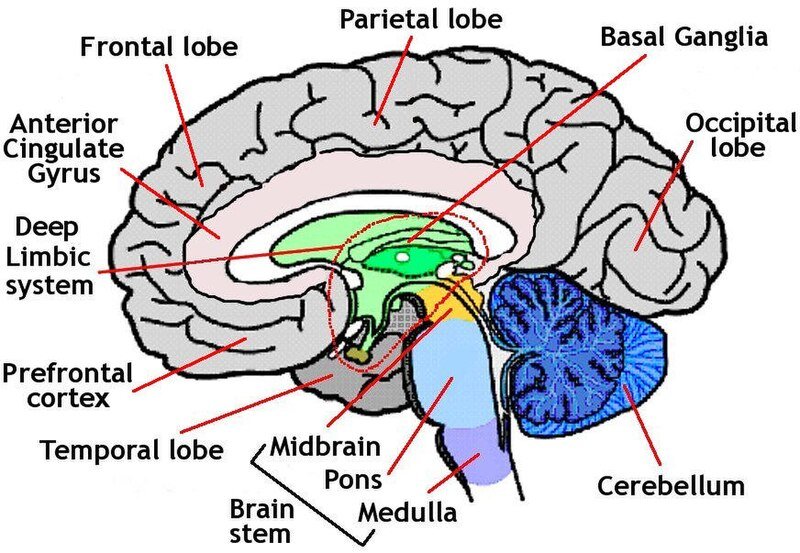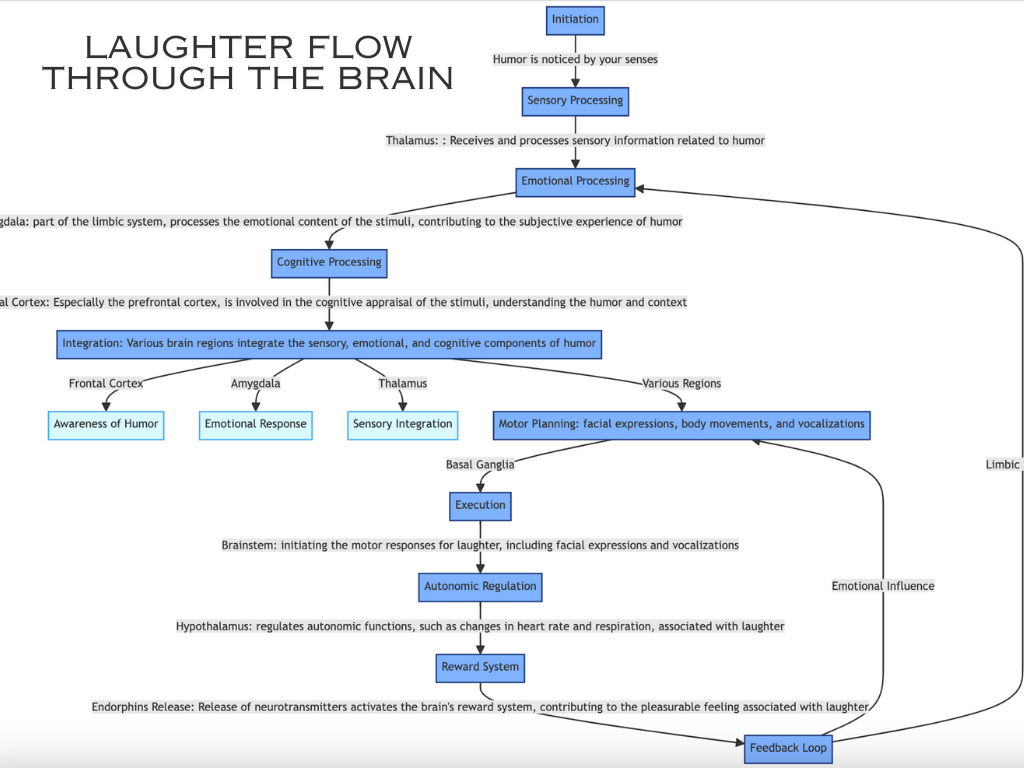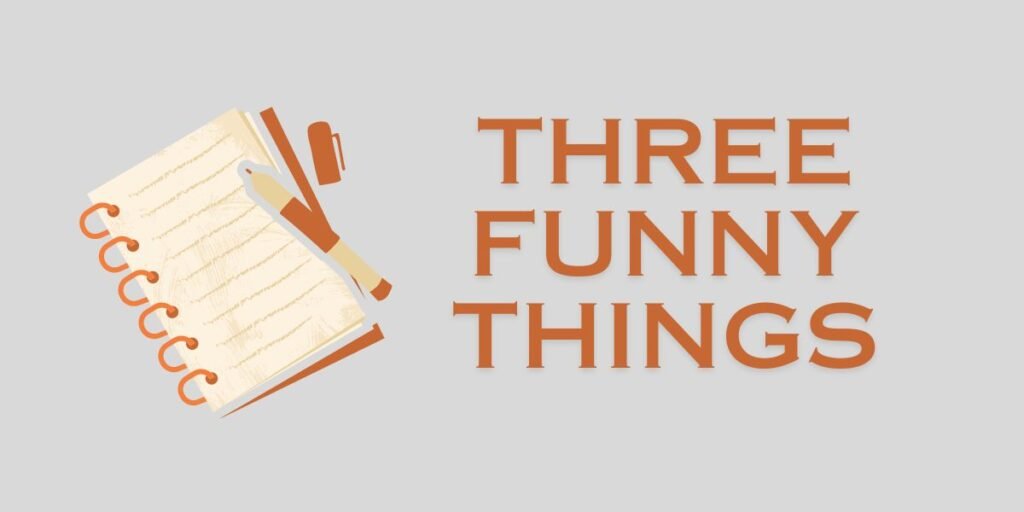Laughter Does What To Our Brains?!
My dad has an uncanny ability to butcher all English idioms. He calls and says “Melissa, that’s a tough nut to swallow.” I die laughing every time as I explain to him for the tenth time that nuts are for cracking and pills are for swallowing.
And somehow, even if I already feel great, I feel even better. I leave the phone call smiling, less tense, and chuckling at his idiosyncrasies all week.
Laughter, the prescription we all need. The medicine that brings cultures together across the globe. It has the ability to immediately soften our moods, relax us, and light up several regions of our brain like the Rockefeller Christmas tree.

How Laughter Affects The Brain
Laughter is multifaceted, playing host to several regions of the brain. Activating many areas of the mind triggers a cascade of positive side effects through the body. Let’s see if we can break down a rudimentary version of the dynamics in the mind. We are not neuroscientists, bear with us!
Thalamus
A chain of responses is initiated when the thalamus senses humor. It processes the sensory information received and relays it to the cerebral cortex where interpretation and complicated matter is processed further.
Limbic System
The limbic system takes center stage next, guiding our emotional and physical responses. The amygdala, part of this system, processes the feelings linked to humor, making us feel joyful and connected when we share a laugh.
At the same time, the hypothalamus, another limbic player, helps control our body’s automatic functions like heart rate during laughter. As we laugh, these brain areas work together, releasing chemicals that make us feel good.
Frontal Cortex
The frontal cortex processes humor and shapes our experience of laughter. Responsible for tasks such as reasoning, social cognition, and executive functions, the frontal cortex contributes to the emotional elements that underlie our response to humor.

It is the brain’s maestro in detecting incongruities and unexpected twists, allowing us to navigate the high subjectivity of jokes. Also, the frontal cortex engages in contextual understanding, deciphering the nuances of humor within social and cultural frameworks.
It allows us to grasp the intentions and perspectives of others, a fundamental skill for interpreting sarcasm, irony, and other forms of sophisticated humor.
It pulls from our mental archives by integrating past experiences, cultural references, and personal associations.
Mirror Neurons
We all know that mimicking and mirroring others when we talk and listen is a common occurrence, it’s only natural that laughter follows the same pattern. Even if you see two people sharing a joke that you are not able to hear, where the participants are smiling and laughing, you likely will also start to smile. Specialized mirror neurons are at work here.
Any time I see my kids laughing at the absurdity of Grizzly and the Lemmings, I also start laughing despite being able to hear the show. Nothing tickles me more than seeing my two year old giggling to herself. Unless, it’s also finding her stuck in the dog crate and needing a full extrication team because what else do two year olds have to do other than pretend they are a dog.

Basal Ganglia and Brainstem
The basal ganglia and brainstem team up to make your body move. The basal ganglia plans and coordinates your gestures and expressions, while the brainstem puts those plans into action, making you laugh out loud.
Endorphin Release
This laughter triggers our brains to release endorphins, natural chemicals that act as mood enhancers and pain relievers. These endorphins bind to receptors in the brain’s pleasure and reward centers, triggering the release of dopamine.
This activation of the reward system reinforces the act of laughter, creating a positive association and makes us feel good. This creates a feedback loop that encourages us to seek out and enjoy humor.
That was mouthful. Who knew laughing was so complex?

What Health Benefits Does Laughter Have?
Laughter, often regarded as medicine for the soul, extends far beyond a simple expression of joy. Scientifically proven to yield a cascade of health benefits, the act of laughter influences mental, physical, and social well-being.
Mental Health:
- 1. Stress Reduction: Laughter triggers the release of endorphins, promoting relaxation and reducing stress.
- 2. Mood Enhancement: The release of dopamine, a neurotransmitter associated with pleasure, contributes to improved mood and reduces negative thoughts.
- 3. Cognitive Function: Laughter stimulates circulation and may enhance cognitive function, improving alertness, creativity and memory recall.
Physical Health:
- 1. Immune System Boost: Laughter has been linked to a strengthened immune system, possibly due to the release of neuropeptides.
- 2. Cardiovascular Benefits: Improved blood flow from laughter may enhance cardiovascular health, reducing the risk of heart disease and lowering your blood pressure.
- 3. Pain Relief: Endorphins released during laughter act as natural painkillers, providing temporary relief from discomfort.
- 4. Muscle Relaxation: The act of laughing engages multiple muscle groups, leading to relaxation and reduced muscle tension.

Social Health:
- 1. Social Bonding: Shared laughter fosters social connections, strengthens relationships, and enhances a sense of community.
- 2. Stress Coping Mechanism: Regular laughter serves as a coping mechanism, helping individuals navigate life’s challenges with resilience.
- 3. Improved Communication: Laughter can break down barriers, ease tension, and improve communication in social interactions.
- 4. Increased Resilience: The positive effects of laughter contribute to emotional resilience, aiding in the ability to bounce back from adversity.
The Release Of Endorphins
When was the last time you laughed so hard that your stomach hurt, and tears streamed down your face? That intense joy and sense of euphoria you experienced were due to the release of endorphins in your brain. These powerful neurotransmitters bind to the opioid receptors in our brain, triggering a wave of pleasure and happiness.
Endorphins not only act as natural painkillers but also boost our mood and overall well-being. They create a sense of contentment and elation, making us feel more connected to ourselves and others. This release during laughter contributes to the immediate sense of relief and relaxation we experience, leaving us feeling lighter and more refreshed.
Beyond their short-term effects, endorphins can have a lasting impact on our mental health. Regular laughter and the subsequent release of endorphins can help alleviate symptoms of depression and anxiety, promoting a more positive outlook on life.
Reduction Of Stress Hormones
In our fast-paced world, stress has become an constant companion, taking a toll on our mental and physical well-being. However, laughter can be a powerful antidote to stress. When we laugh, our body’s stress response is interrupted, and the production of stress hormones, such as cortisol, decreases.

Cortisol, often referred to as the “stress hormone,” is released in response to perceived threats and triggers the body’s fight-or-flight response. While cortisol is essential for survival, chronic stress and elevated cortisol levels can have detrimental effects, leading to increased anxiety, depression, and impaired cognitive function.
Fortunately, laughter provides a natural and effective way to counteract the negative impact of stress hormones. When we laugh, our body enters a state of relaxation, triggering a release of tension and allowing us to let go of stress. This reduction in stress hormones not only improves our mood but also enhances our overall well-being and resilience.
Boosting The Immune System
Laughter is a powerful tool for strengthening our immune system, which plays a vital role in protecting our body against infections and diseases. Research has shown that laughter increases the production of antibodies and activates immune cells, enhancing our body’s defense mechanisms.
When we laugh, our body undergoes physiological changes that have a positive impact on our immune system. The release of endorphins and the reduction in stress hormones contribute to this immune-boosting effect. Also, laughter increases the production of natural killer cells, which are responsible for detecting and eliminating cancer cells and infected cells. You have yourself a natural remedy for a healthier immune system!

Improving Social Connections
Laughter is a powerful social bonding tool, fostering connections between individuals and strengthening relationships. When we laugh together, it creates a sense of belonging and shared experiences, deepening our connection with others.
Think about the last time you shared a moment of laughter with someone – a friend, a family member, or even a stranger. In that moment, barriers dissolved, and you experienced a sense of unity and understanding. Laughter has the ability to break down social walls, bridging gaps between people and fostering a sense of community.
It’s contagious and for good reason. When we hear someone laugh, it triggers a response in our brain that makes us more likely to laugh as well as reinforcing strong relationships.
Enhancing Cognitive Function
Laughter is not only beneficial for our emotional well-being but also has a positive impact on our cognitive function. When we laugh, our brain is stimulated, leading to improved memory, creativity, and problem-solving skills.
Research has shown that laughter increases blood flow to the brain, delivering oxygen and nutrients essential for optimal cognitive function. Additionally, laughter stimulates the release of dopamine, the neurotransmitter associated with memory and reward, which enhances our ability to think creatively and find innovative solutions to problems.
The Role Of Laughter And Mental Health
Humor plays a significant role in promoting positive mental health and well-being.
Regular laughter has been shown to reduce symptoms of depression, anxiety, and fatigue, increase self-esteem, improve sleep and overall life satisfaction. By releasing endorphins, reducing stress hormones, and fostering social connections, laughter creates a positive environment for mental health to thrive.
Furthermore, laughter acts as a natural coping mechanism, helping us navigate the challenges and setbacks we encounter in life. It provides a temporary escape from our worries and allows us to gain a fresh perspective on our problems. The ability to find humor in difficult situations can be empowering, giving us the strength and resilience to overcome adversity.
Laughter Therapy And Its Benefits
Laughter therapy is taking the podium as a great alternative to modern medicine, emerging as a great tool in healing. Intentional exercises that stimulate laughter have immediate short and long term positive side effects.
In 1964, Norman Cousins, a researcher on human emotions at UCLA, was diagnosed with a degenerative disease that caused constant pain and suffering. The doctors told him he only had a few months to live. He knew the power positive emotions had on people’s well-being so he took matters into his own hands.
He had his medical care team prescribe him a higher than normal dose of vitamin C and coupled that with self induced laughter therapy. He consistently watched funny movies and television shows as part of his daily regimen. This intentional laughter greatly reduced his pain and lowered his stress.

Cousins reported, “Ten minutes of laughter gave me two hours of pain free sleep. Laughter produced a natural body anesthesia.” The result: an extra 25 years of a fulfilling life for Norman.
Countless studies have shown the benefits of laughter from cancer patients to children learning in school and everything imaginable in between.
Ways To Incorporate More Laughter And Humor Into Your Life
By consciously seeking out opportunities for laughter, we can nurture our mental health and create a more joyful and fulfilling life.

It’s said that children laugh over 300 times a day and adults a mere 17 times. Parents, it’s time we up our game. And ChatGPT says there are a million ways to do this. Here’s 20 of our favorites!
- Comedy Podcasts: Listen to comedy podcasts during your commute or breaks.
- Joke of the Day: Share or read a joke every morning to kickstart your day with laughter.
- Share Memes: Share funny memes with friends or colleagues.
- Funny Emails: Include a light-hearted comment or joke in work-related emails.
- Laughter Challenges: Challenge yourself to find and share funny content daily.
- Random Acts of Humor: Surprise someone with a random act of humor or kindness.
- Game Night: Host a game night with friends or family, focusing on fun and laughter.
- Socialize with Humor: Surround yourself with friends who appreciate humor.
- Create a Humor Scrapbook: Collect funny quotes, pictures, and memories in a scrapbook.
- Funny Awards: Introduce lighthearted awards for achievements, acknowledging humor.
- Funny Ringtones: Set a humorous ringtone for your phone to make you smile.
- Greeting Cards: Send or receive funny greeting cards for special occasions.
- Impromptu Karaoke: Sing funny or silly songs during karaoke sessions.
- Social Media Humor: Follow social media accounts or pages that share funny content.
- Funny Fitness: Engage in activities like laughter yoga or dance workouts for fun exercise.
- Play Silly Games: Engage in games that involve humor, like charades or funny board games.
- Themed Dress-Up Days: Organize occasional themed dress-up days to add fun to the workplace.
- Desk Humor: Add humorous desk decorations or items to lighten the mood.
- Funny Food Creations: Get creative with food presentations, turning meals into fun experiences.
- Write a Funny Journal Entry: Document funny moments in a daily journal.
Can Laughter Heal You?
Yes. In so many ways. Adding more laughter into your days and your children’s days is going to enrich your life beyond measure. There is a talk by comedian Greg Kettner that shares the power of humor and the beginnings of healing.
A son and a dad walk into his show, sit up front, both looking angry and unhappy. Greg made it his mission to make the two of them laugh. By the end of the show they were laughing.
Greg goes to see them afterwards and asks them if they’ve been to the show before. It turns out they have been walking past the comedy club for eight weeks straight as they visited their wife and mother in the hospital who was being treated for breast cancer. He asks them how she is doing.
She had passed away that day. And these two men told Greg ‘Thank you. This is the first time we’ve almost felt normal.’ What a powerful instrument laughter can be in someone’s life. A moment of joy in a tumultuous time. A companion.
Try This: Three Funny Things Exercise
Ready for your foray into all things humor? Positive psychology researchers suggest you try this happiness enhancing exercise every day before bed for several weeks. Coaches and therapists, this is also a great activity to add to your toolbox.

Step 1: Recall three funny things that happened today. This could be anything you saw, heard, or did. Fully relive the memory and recognize the positive feelings that came with it.
Step 2: Write down the three funny things in a notebook or digital journal. Jot down the event title along with details of the event, followed by the way it made you feel.
From my first Three Funny Thing journal entry – My 6 year old son sat on the edge of the kitchen counter where somehow he managed to fall backwards into the sink. We were cooking in the kitchen and were having a casual conversation when all the dishes clattered loudly under the weight of his behind suddenly crushing them. We both found this hilarious and surprised at the abrupt noise and his awkward position he found himself in, like a large man in a too tiny bathtub.
Step 3: Write down why each of these three things happened. What contributed to their occurrence and did you play a role in this fun event?
I’ve enjoyed going through my past funny journal entries when needing a pick me up. It’s an instant mood lifter. Making a habit of recalling and savoring humorous moments in your life will improve your happiness and overall wellbeing. This will help you bring awareness to fun experiences rather than dwell on problems in your life (hello to spending another minute in your kitchen making your 65th meal and snack of the week for your family…).
If you try this, shoot us an email with what you thought and some of the funniest moments you encountered!
It’s time to break out your good sense of humor, share a funny joke, eliminate those stressful situations, and allow the best medicine on the planet to work its magic.